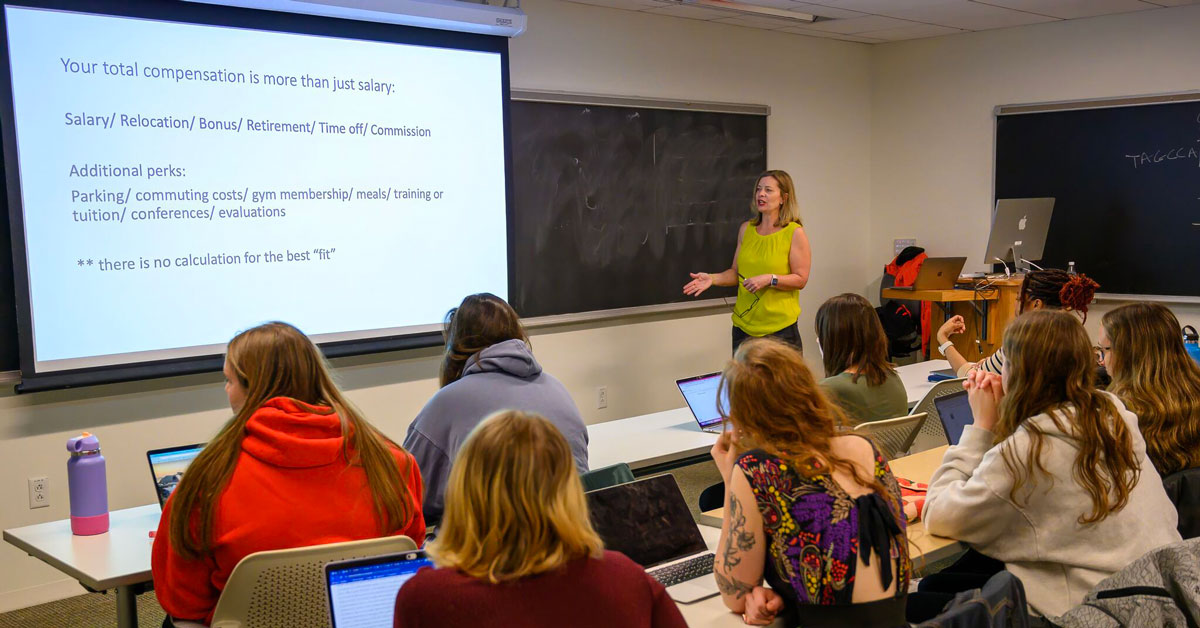Gaining skills in strategic conversations at work

Professor Kim Miller’s “Learn to Negotiate” course equips students to ask for the salary they want
According to a 2023 survey by the Pew Research Center, most U.S. workers said they did not negotiate for a higher salary than what was offered the last time they were hired for a job. Professor of the History of Art Kim Miller teaches a course at Wheaton College that seeks to change that. In her “Learn to Negotiate” course, students acquire strategies for successful negotiations in their future careers. The course explores the societal factors driving income inequality and pay disparity in the U.S., and the historical and current efforts to combat the race- and gender-based pay gap.Wheaton magazine editor Sandy Coleman asked Professor Miller a few questions.
What inspired you to teach a course about negotiation skills?
“As a graduate student, I was lucky to have a group of mentors who taught me how to negotiate when I got my first job offer. As a result, I started my career by successfully negotiating on my own behalf. In the years that followed, I was surprised to find out that most people I met did not negotiate—sometimes not ever. …At first I designed and taught negotiation workshops to my students in my senior seminars, as a measure to help prepare them for life beyond Wheaton. I often partnered with Career Services and Alumni Relations on these efforts, and students frequently told us that learning how to negotiate was one of the most valuable skills they learned at Wheaton. …Every semester I hear from at least one alum who writes to tell me that the workshop helped give them the confidence to speak up for themselves at work, to ask for better treatment or compensation, and, in a few cases, gave them the courage to find another job when they did not feel sufficiently valued. This feedback inspired me to design a semester-long course about negotiation and equity in the workplace.”
Why is understanding income inequality important in this context?
“Negotiation in the context of work is really about three things: self advocacy, feeling like you are valued at work and income equality. Most students have heard about the wage gap before coming into class, and yet nearly all of them believe it will not affect them. It will! So we spend considerable time talking about societal factors driving income inequality and pay disparity in the United States, with an intersectional focus. We also cover related and relevant content, such as historical and current efforts to combat the pay gap, including labor organizing and legislative efforts. It’s important for students to understand this history, as well as the ongoing reality and harm of the pay gap today.”
What key principles or strategies do you emphasize in your teaching of negotiation?
“Identify your BATNA (best alternative to a negotiated agreement) or, as my former negotiation coach told me, your ‘deal breaker.’ Prioritize what you want and start the negotiation with your most important ‘ask’ [this is usually, but not always, to increase base salary]. Make your ‘why I’m worth more’ list. Actually write down a list. Rehearse it, believe it and use it in the negotiation. And we talk about the importance of being an ally—at work and in the negotiation process.”
What are some common challenges students face when learning to negotiate?
“They are afraid of feeling awkward—not just during the negotiation, but afterward while at work with the same colleagues they negotiate with [especially if the negotiation did not go in their favor]. Students who identify as female, and students of color, are aware of the gendered and racialized dynamics in negotiation, and they might feel an added pressure based on their own identities. And because negotiation is a new experience for most of them, they often express a lack of confidence about what to say, or how to begin.”
How do you encourage students to practice negotiation skills?
“I love bringing alumni together in panel presentations for my classes. For this one, I ask former students to talk about their own negotiation experiences at work. Their stories are incredible, and they make me so proud. When my current students hear from and speak to alumni, it helps make the experiences more real for them. They remember the details. I also use classroom time to practice negotiation exercises and role play with the students. For example, I might give them scripts and ask them to role play in small groups or in pairs. It’s awkward! But better to be awkward in the classroom, where it’s OK to stumble over one’s words a bit, than to do it for the first time with your real job. Practicing gives them increased confidence and competency with scripts, and with successful negotiation strategies.”
What are your top tips for successful negotiation?
“Research. Practice. Understand yourself, your core values and how you hope to see those values reflected in your work. Know when to walk away.”
What is the most important lesson you hope students gain from the class?
“To believe in themselves and to use their voices to advocate for themselves and for others.”
